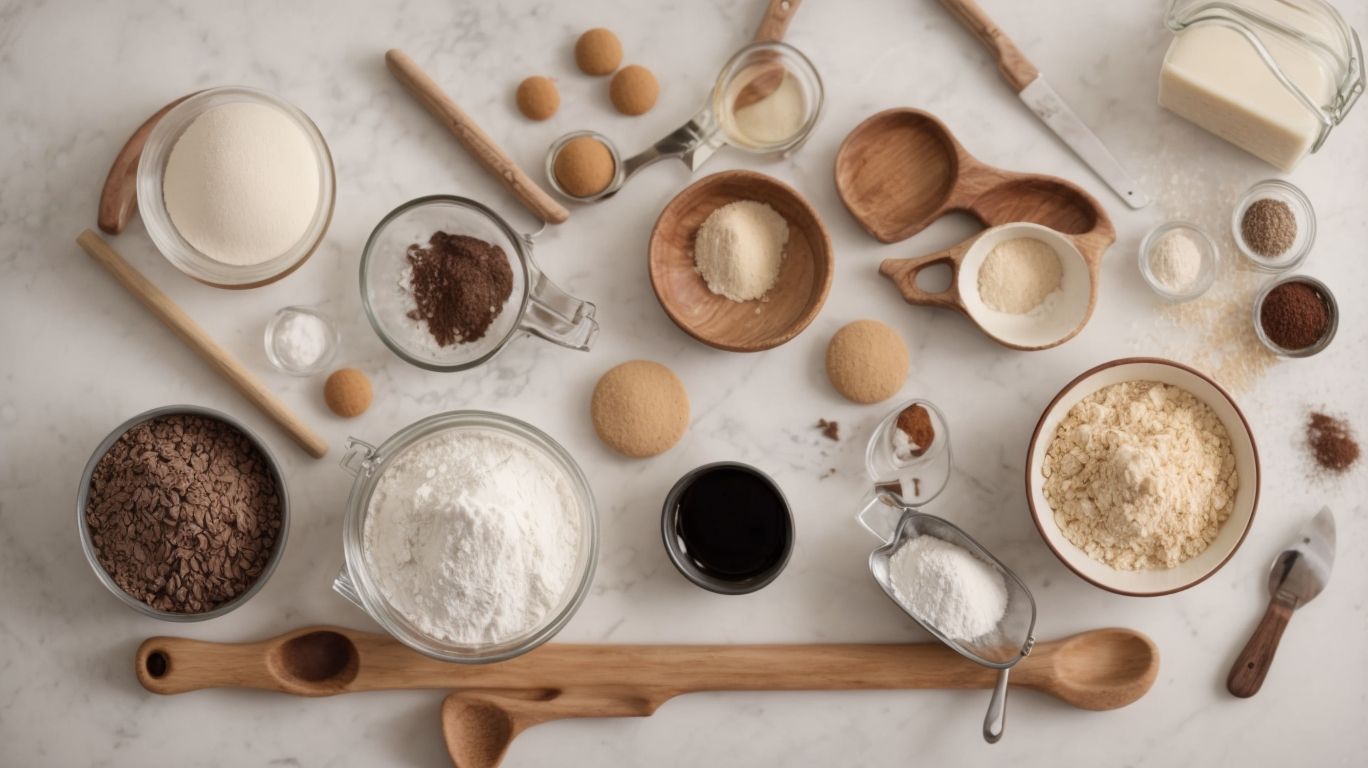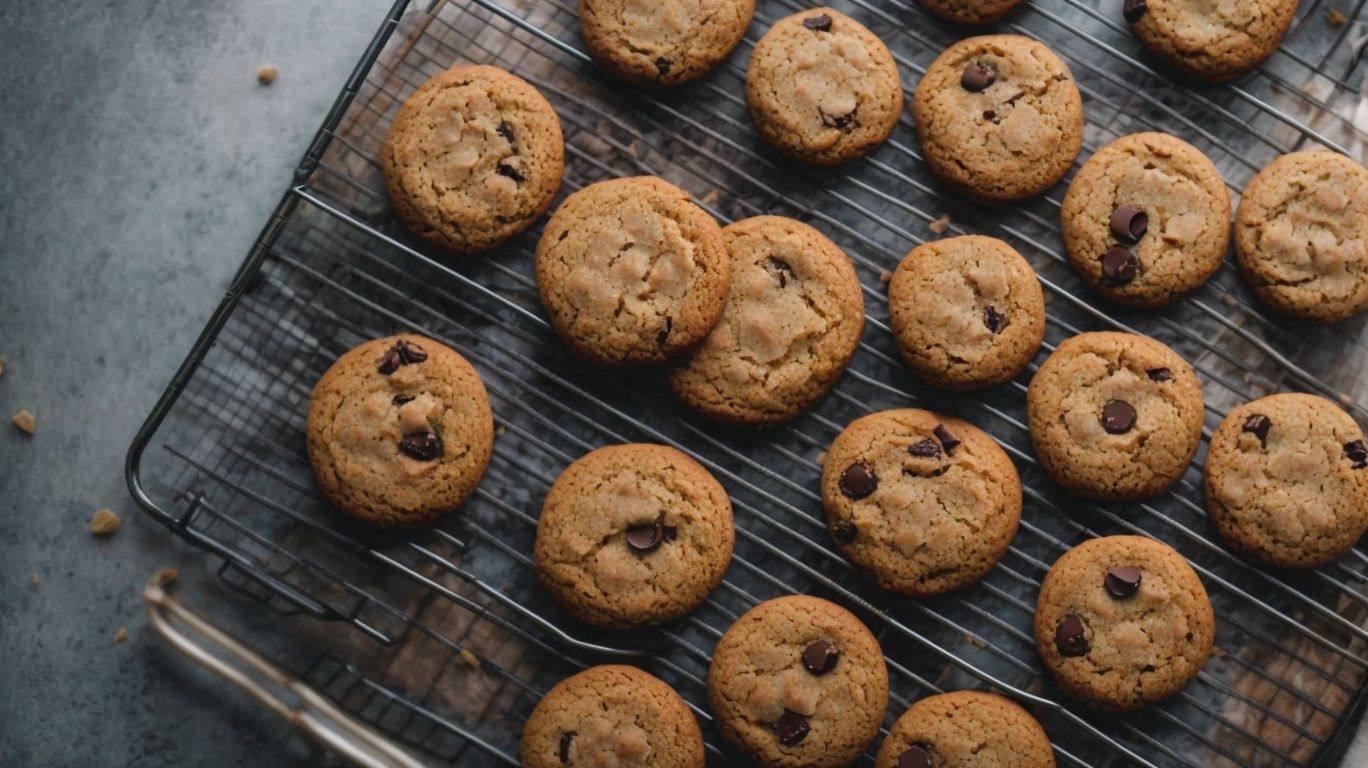How to Bake Vegan Cookies?
Curious about what a vegan diet entails? Wondering what you can and can’t eat on a vegan diet? Interested in baking some delicious vegan cookies?
In this article, we will explore vegan baking, from essential ingredients to common substitutions, and provide a step-by-step guide to baking perfect vegan cookies, along with mouth-watering recipes to try.
Get baking and dive into the world of vegan cookies!
Key Takeaways:
What Is a Vegan Diet?
A vegan diet is a plant-based eating regimen that excludes all animal products and by-products, focusing on fruits, vegetables, grains, and legumes.
At the core of a vegan diet lies the philosophy of compassion for animals, sustainability, and the belief that plant-based foods are sufficient for meeting nutritional needs. By avoiding meat, dairy, eggs, and honey, vegans align their dietary choices with ethical and environmental concerns.
Key principles of veganism emphasize the consumption of nutrient-dense foods like leafy greens, nuts, seeds, and whole grains to ensure a well-rounded and balanced diet. Vegan nutrition is rich in fiber, antioxidants, vitamins, and minerals, often leading to improved overall health and reduced risk of chronic diseases.
What Can You Eat on a Vegan Diet?
On a vegan diet, individuals can consume a variety of plant-based foods such as fruits, vegetables, whole grains, and legumes to meet their nutritional needs and preferences.
These food groups offer a wide range of essential nutrients like vitamins, minerals, fiber, and antioxidants that support overall health and well-being.
- Fruits provide natural sweetness, vibrant colors, and refreshing flavors, making them an excellent snack or addition to smoothies and desserts.
- Vegetables, with their array of textures and tastes, can be enjoyed raw in salads, steamed, roasted, or sautéed to complement main dishes.
- Whole grains like quinoa, brown rice, and oats are excellent sources of complex carbohydrates for sustained energy, while legumes such as beans, lentils, and chickpeas are rich in protein, fiber, and iron, offering versatility in soups, stews, salads, and wraps.
What Can’t You Eat on a Vegan Diet?
Animal products and by-products are strictly avoided in a vegan diet, prohibiting the consumption of meat, dairy, eggs, honey, and other items derived from animals.
These exclusions are based on the principles of not only dietary preference but also ethical and environmental concerns. By eliminating animal-derived products, vegans aim to reduce the demand for animal agriculture, which is often associated with issues such as cruelty to animals, deforestation, and greenhouse gas emissions. Many vegans believe in promoting a more sustainable food system that is kinder to animals and the planet. Therefore, the decision to follow a vegan diet goes beyond personal health benefits and extends to creating a positive impact on a broader scale.
Why Bake Vegan Cookies?

Credits: Poormet.Com – Mark Torres
Baking vegan cookies offers a cruelty-free and plant-based alternative to traditional cookie recipes, catering to individuals with dietary restrictions or ethical preferences.
Embracing vegan baking not only supports animal welfare but also provides a nutritious treat for those with lactose intolerance or egg allergies. By swapping out animal-based ingredients like butter and eggs, bakers can experiment with healthier substitutes like flaxseed meal, applesauce, or coconut oil.
Baking vegan cookies contributes to environmental sustainability by reducing the carbon footprint associated with animal agriculture. Choosing local and organic ingredients for these recipes can further enhance their eco-friendly impact, making the baking process a mindful and health-conscious endeavor.
Ingredients for Vegan Cookies
The key ingredients for vegan cookies include coconut oil, flour, chocolate chips, sugar, and vanilla extract, providing the essential components for creating delicious dairy-free and egg-free treats.
Coconut oil acts as a wonderful substitute for butter in vegan baking, contributing to a moist texture and rich flavor. The flour not only binds the ingredients together but also gives the cookies their structure. As for chocolate chips, they add bursts of sweetness and decadence to the overall taste profile. Sugar brings the necessary sweetness, enhancing the flavors, while vanilla extract imparts a delightful aroma and flavor. When combined in the right proportions, these ingredients work harmoniously to produce flavorful and chewy vegan treats that are just as satisfying as traditional cookies.
What Are the Essential Ingredients for Vegan Cookies?
The essential ingredients for vegan cookies encompass coconut oil for moisture, flour for structure, chocolate chips for flavor, sugar for sweetness, and vanilla extract for enhanced taste.
Coconut oil plays a vital role in vegan baking, providing the necessary moisture to create a soft and chewy texture in cookies. It also adds a subtle hint of coconut flavor, enhancing the overall taste profile.
The type of flour used, such as almond flour or whole wheat flour, determines the cookie’s structure and texture.
Chocolate chips not only add a delightful burst of sweetness but also melt during baking, creating pockets of gooey goodness.
Sugar is not only a sweetener but also contributes to the cookie’s texture and helps with browning.
Lastly, vanilla extract elevates the flavor by imparting a warm, aromatic essence to the cookies.
What Are Some Common Substitutions for Non-Vegan Ingredients?
Common substitutions for non-vegan ingredients in vegan cookies include using plant-based milk instead of dairy milk, flaxseed meal as an egg alternative, and coconut oil in place of butter.
Plant-based milk, such as almond or oat milk, not only adds a creamy texture to cookies but also provides a subtle nutty flavor. Flaxseed meal, when mixed with water, acts as a binding agent similar to eggs, enhancing the moisture and structure of the baked goods without the need for animal products. Coconut oil, with its natural sweetness and mild coconut undertones, lends a rich taste and moistness to vegan cookies, making them just as decadent and delicious as traditional recipes.
Tools and Equipment Needed for Baking Vegan Cookies

Credits: Poormet.Com – Brandon Martin
To bake vegan cookies, you will require basic kitchen tools such as mixing bowls, measuring cups, a cookie scoop, and a baking sheet for preparing and baking the dough.
Additionally,
- spatulas come in handy for mixing the ingredients evenly
- parchment paper prevents sticking during baking
- It’s essential to have a silicone baking mat to ensure even baking and easy cleanup
- A hand mixer or a stand mixer can help with blending ingredients smoothly
- A cooling rack is necessary for letting the cookies cool down after baking
Don’t forget about cookie cutters for shaping the dough into fun shapes before baking for a delightful treat!
Step-by-Step Guide to Baking Vegan Cookies
Follow this step-by-step guide to bake delicious vegan cookies, starting with preparing the dough, shaping the cookies, and baking them to golden perfection.
Begin by preheating your oven to the recommended temperature for baking the cookies. While the oven is preheating, line a baking sheet with parchment paper to prevent the cookies from sticking.
Next, take the prepared dough and scoop out small portions using a cookie scoop or a spoon. Roll these portions into balls and place them on the baking sheet, spacing them out evenly to allow for spreading.
Once the cookies are shaped and arranged, it’s time to bake them in the preheated oven. Keep a close eye on them to ensure they are baked to a perfect golden hue.
Preparing the Dough
Begin the vegan cookie baking process by combining coconut oil, sugar, flour, and chocolate chips in a mixing bowl to create a rich and flavorful cookie dough.
Once the ingredients are assembled, it’s time to blend them together to form the perfect cookie base. Start by creaming the coconut oil and sugar until smooth and creamy, ensuring a uniform texture.
Gradually add in the flour, a little at a time, making sure to incorporate it thoroughly after each addition. This will help in achieving the right consistency and prevent any lumps in the dough.
Gently fold in the chocolate chips, distributing them evenly throughout the dough for that burst of chocolatey goodness in every bite.
Shaping the Cookies
Use a cookie scoop to portion the vegan cookie dough onto a baking sheet, ensuring consistent cookie sizes and shapes for even baking and attractive presentation.
When using a cookie scoop, every scoop of dough results in a perfectly round shape, creating a professional bakery-like finish. By maximizing the use of the scoop’s design, you can achieve uniformity in size, ensuring even baking throughout. This tool is a game-changer for bakers aiming for precision!
Experimenting with different scoop sizes can lead to various cookie sizes, offering versatility in your baking creations. From bite-sized treats to larger indulgent cookies, the scoop enables you to control the portioning effortlessly.
Baking the Cookies
Bake the shaped vegan cookies in a preheated oven for the specified time until they turn golden brown, ensuring proper texture and flavor development.
Set your oven temperature to 350°F and place the baking tray with the cookie dough inside. Allow the cookies to bake for approximately 10-12 minutes, but make sure to monitor them closely towards the end of the baking time to prevent over-browning. A key visual cue to look for is the edges of the cookies turning a light golden color. Once you notice this, remove the cookies from the oven and let them cool on the baking sheet for a few minutes before transferring them to a wire rack to cool completely.
Vegan Cookie Recipes to Try
Experiment with a variety of delicious vegan cookie recipes, including classic chocolate chip, wholesome oatmeal raisin, and indulgent peanut butter variations.
If you are craving a chewy and chocolatey treat, the classic vegan chocolate chip cookies are a must-try. These cookies are made with dairy-free chocolate chips, creating a rich and decadent flavor that rivals any traditional recipe.
For those looking for a heartier option, the oatmeal raisin cookies offer a perfect blend of sweet and nutty flavors. The combination of oats, raisins, and a touch of cinnamon makes these cookies a comforting choice for snack time or dessert.
On the other hand, if you prefer a creamy and nutty experience, the vegan peanut butter cookies will not disappoint. With their melt-in-your-mouth texture and robust peanut butter taste, these cookies are a delightful balance of sweet and salty notes.
Whether you have a preference for classic favorites or want to explore new vegan baking techniques, these recipes are sure to satisfy your sweet cravings in a cruelty-free way.
Classic Chocolate Chip Cookies
Indulge in the timeless joy of classic vegan chocolate chip cookies, combining flour, vegan butter, chocolate chips, and brown sugar for a chewy and delectable treat.
Begin by preheating your oven to 350°F (180°C) and lining a baking sheet with parchment paper or a silicone baking mat.
In a large mixing bowl, cream together 1 cup of vegan butter and 3/4 cup of brown sugar until light and fluffy. Then add 2 cups of all-purpose flour, 1 teaspoon of baking soda, and a pinch of salt, mixing until well combined.
Gently fold in 1 1/2 cups of vegan chocolate chips into the dough, ensuring they are evenly distributed.
Using a spoon or a cookie scoop, drop rounded tablespoons of dough onto the prepared baking sheet, spacing them about 2 inches apart.
Bake for 10-12 minutes, or until the edges are lightly golden. Let the cookies cool on the baking sheet for a few minutes before transferring them to a wire rack to cool completely.
Enjoy these vegan chocolate chip cookies with a glass of plant-based milk or a cup of hot tea for a delightful vegan dessert experience.
Oatmeal Raisin Cookies
Savor the wholesome goodness of vegan oatmeal raisin cookies, blending oats, raisins, cinnamon, and vegan butter for a hearty and nutritious cookie option.
These vegan oatmeal raisin cookies are not only delicious but also packed with fiber and natural sweetness. The combination of chewy oats, plump raisins, and fragrant cinnamon creates a symphony of flavors in each bite.
Using vegan butter ensures that these cookies are dairy-free, making them suitable for those with dietary restrictions or preferences. The warm aroma that fills your kitchen as they bake is simply irresistible, tempting you to indulge in a warm, freshly baked treat.
Peanut Butter Cookies
Delight in the rich flavors of vegan peanut butter cookies, featuring creamy peanut butter, sugar, vanilla extract, and a hint of salt for a perfect balance of sweetness and nuttiness.
To create these delectable treats, start by preheating your oven to 350°F (180°C) and lining a baking sheet with parchment paper. In a mixing bowl, combine 1 cup of creamy peanut butter, 1/2 cup of sugar, 1 teaspoon of vanilla extract, and a pinch of salt, stirring until smooth. Gradually add 1/2 cup of flour, folding it in gently to form a soft dough. Use a cookie scoop to portion out dough balls onto the prepared baking sheet, then gently press each ball with a fork to create a crisscross pattern. Bake for 10-12 minutes until the edges are lightly golden. Allow the cookies to cool on the baking sheet before transferring to a wire rack to cool completely. Enjoy these vegan peanut butter cookies with a glass of plant-based milk for a delightful snack!
Tips for Perfecting Your Vegan Cookies

Credits: Poormet.Com – Carl Garcia
Enhance your vegan cookie-baking skills with expert tips on achieving the ideal texture, flavor balance, and presentation for delectable plant-based treats.
One crucial aspect for achieving the perfect texture in vegan cookies is selecting the right combination of ingredients. Opt for plant-based substitutes like applesauce, flax eggs, or mashed bananas to provide moisture and binding properties without compromising the final result. Consider experimenting with various vegan butter alternatives to enhance the flavor profile and texture of your cookies. Incorporating ingredients such as coconut oil, avocado, or nut butter can add richness and depth to your creations.
Conclusion

Credits: Poormet.Com – Kyle Carter
Baking and enjoying vegan cookies provides a delicious and compassionate way to indulge in sweet treats without compromising on flavor or values.
Embracing the art of vegan cookie baking means savoring treats that are not only kind to animals and the planet but are also loaded with wholesome, plant-based ingredients. These cruelty-free creations are rich in nutrients like fiber, antioxidants, and vitamins, offering a guilt-free indulgence. Opting for vegan cookies supports a sustainable lifestyle, reducing the carbon footprint associated with animal products. By exploring the world of vegan baking, one can delight in a wide range of flavors, textures, and recipes that cater to various dietary preferences while aligning with ethical values.
Frequently Asked Questions
How to Bake Vegan Cookies?
1. What ingredients do I need to bake vegan cookies?
The main ingredients you will need to bake vegan cookies are flour, plant-based milk, vegan butter or oil, and a vegan sweetener such as maple syrup or agave nectar. You may also want to add in vegan chocolate chips or other mix-ins for flavor.
2. Can I use regular flour to make vegan cookies?
Yes, you can use regular flour to make vegan cookies. However, if you want to make them completely vegan, be sure to use a plant-based milk and a vegan sweetener in the recipe as well.
3. Do I need to chill the cookie dough before baking?
It is not necessary to chill vegan cookie dough before baking, but it can help with the texture and make the cookies chewier. If you are short on time, you can skip this step.
4. Can I substitute applesauce for eggs in vegan cookie recipes?
Yes, applesauce can be used as a substitute for eggs in vegan cookie recipes. Use 1/4 cup of applesauce for every egg called for in the recipe.
5. How do I make my vegan cookies softer?
To make your vegan cookies softer, you can try adding in a bit of vegan yogurt or extra plant-based milk to the dough. You can also slightly under-bake them to keep them from getting too crispy.
6. How long do vegan cookies last?
Vegan cookies can last for up to a week if stored in an airtight container at room temperature. You can also freeze them for longer storage, just be sure to thaw them before serving.

